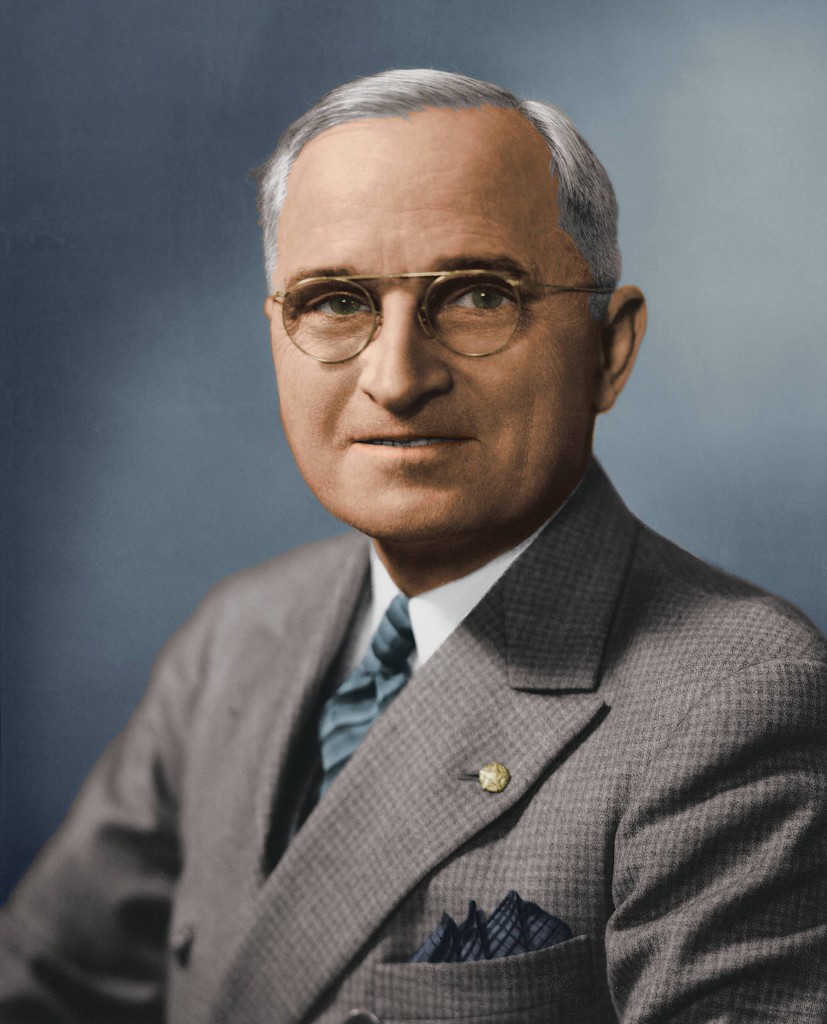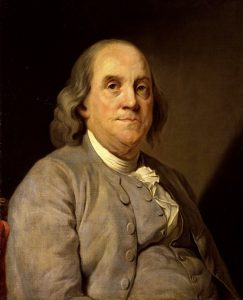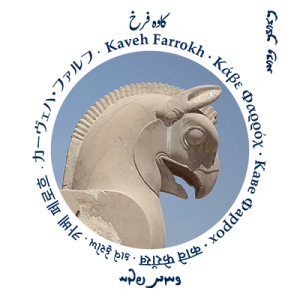The article below “Ancient Persian Ruler Influenced Thomas Jefferson, U.S. Democracy” by Lea Terhune was posted on the U.S. Department of State website on March 13, 2013. Kindly note that excepting one image, all other images and accompanying descriptions do not appear in the original U.S. Department of State posting. Two comments by Kaveh Farrokh have also been inserted into the article.
================================================================================
The discovery of the Cyrus Cylinder was a hundred years in the future when Thomas Jefferson and other founders of the United States adopted the progressive ideas of the ancient Persian ruler Cyrus the Great. They knew of Cyrus through classical Greek writers and Biblical accounts.
A copy of Xenophon’s Cyropaedia that belonged to Thomas Jefferson is on display with artifacts on loan from the British Museum in the exhibition The Cyrus Cylinder and Ancient Persia: A New Beginning, at the Smithsonian Institution’s Arthur M. Sackler Gallery in Washington. The exhibition also will tour Houston, New York, San Francisco and Los Angeles.
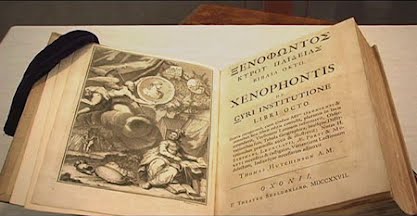
Thomas Jefferson’s copy of the Cyropaedia (Picture Source: Angelina Perri Birney). Like many of the founding fathers and those who wrote the US Constitution, President Jefferson regularly consulted the Cyropedia – an encyclopedia written by the ancient Greeks about Cyrus the Great. The two personal copies of Thomas Jefferson’s Cyropaedia are in the US Library of Congress in Washington DC. Thomas Jefferson’s initials “TJ” are seen clearly engraved at the bottom of each page.
The Cyropaedia is a partly fictional portrayal of the life and deeds of Cyrus the Great (c. 580–530 B.C.), who founded the Achaemenid Empire, which continued for nearly 200 years. He created an efficient bureaucracy to oversee disparate cultures within his vast empire and governed with tolerance that evoked admiration in the ancient world. The book was written a century after Cyrus died. It was not meant to be a factual history, but it captured ideas that characterized his rule.
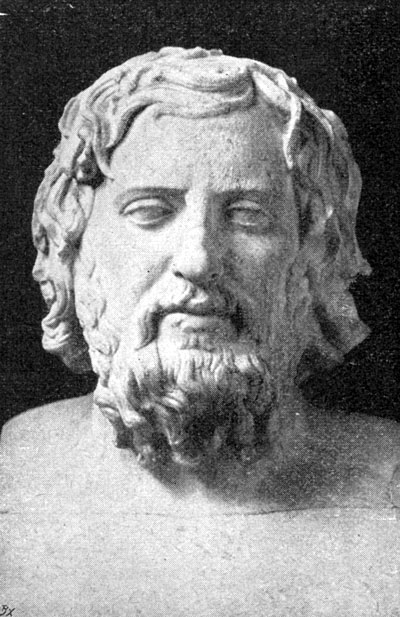
Xenophon (431-355 BC) wrote a compendium of Cyrus, known as the Cyropaedia. The Cyropaedia has been consulted as a standard reference of just statesmanship by a number of prominent western leaders in history.
Julian Raby, director of the Freer Gallery of Art and Arthur M. Sackler Gallery, said before the exhibition’s opening that Jefferson possessed two editions of the Cyropaedia. The one on display, usually kept at the Library of Congress, dates from 1767. It features Greek and Latin parallel texts on facing pages.

President Thomas Jefferson (1743-1826) of the United States of America.
As noted by Raby:
“What’s extraordinary is that he
[Thomas Jefferson] scratched out one line. The particular passage that was crossed out is a problematic passage in the manuscript … it is quite clear that Jefferson himself must have been collating line by line between his earlier edition and this later edition.”The bold black line over the dubious Greek passage may be seen in the exhibition. Raby said that it shows the degree of attention Jefferson paid to this book. A quote from Jefferson, taken from a letter to his grandson Francis Wayles Eppes, is featured on the gallery wall above the Cyropaedia:
“… I would advise you to undertake a regular course of History and Poetry in both languages. In Greek, go first thro’ the Cyropaedia, and then read Herodotus, Thucydides, Xenophon’s Hellenus and Anabasis …”
Comment by Kavehfarrokh.com: Few are aware that Thomas Jefferson had also advised his grandson to study, in addition to various Classical works, the Cyropaedia (as noted in The Metropolitan Museum of Art, 2013).
Benjamin Franklin also read the classics and was familiar with Xenophon’s work. British Museum Director Neil MacGregor noted that Jefferson’s Cyropedia is the Glasgow edition. Jefferson had a close intellectual connection to the Scottish Enlightenment, thanks to his tutelage as an undergraduate at the College of William and Mary by William Small, a Scotsman from Aberdeen. Scottish intellectuals referred to the accounts of Cyrus in their efforts to sort out the “pressing question of church and state.”
The tolerance shown by Cyrus toward diverse religions and cultures was a historical first. British Museum exhibition curator John Curtis said: “The Cyrus Cylinder and associated objects represent a new beginning for the Ancient Near East.”
Harry S. Truman (1884-1972) who was President of the United States in 1945-1953 acknowledged the legacy of Cyrus the Great in liberating the Jews from their Babylonian captivity; For more Click here…
The idea of freedom of religion appealed to the founders of the United States, which was originally colonized, in part, by Europeans escaping religious persecution. One revelation of the Cyrus Cylinder exhibition, according to MacGregor, is:
“…the importance of Cyrus to those who wrote the Constitution of the United States…The story of Persia — Iran — is part of the story of modern United States.”
He said that although 18th-century Europeans read and commented on the tenets of religious freedom and tolerance set down by Cyrus, only the United States’ founders enshrined them in law.
Koresh or Cyrus street in Jerusalem. There is currently no street named Cyrus or Koroush in Tehran, the capital of Iran today. There is also an “Iran” street in Israel.
Comment by Kavehfarrokh.com: As noted by Sheda Vasseghi in her 2017 Dissertation “The Positioning of Iran and Iranians in the Origins of Western Civilization” (University of New England, Committee Members: Marylin Newell, Ph.D, Laura Bertonazzi, EdD, Kaveh Farrokh, Ph.D):
“Researchers may look for Iranian footprints in modern history of Western Civilization. For example, a study may focus on Zoroastrianism and the modern West. In a letter to the president of then Yale College Ezra Stiles, American Founding Father and polymath Benjamin Franklin wrote about the recent translation of Zoroaster’s writings called Zend-Avesta and said he would ship Stiles a copy given its teachings of morality (Franklin, 1772).”
The scientist, inventor, writer, publisher, and statesman Benjamin Franklin (1706-1790) one of the founder fathers of American democracy (Source: Public Domain). Few are aware of the influence of ancient (pre-Islamic) Iran on the founding fathers of America and Western civilization.

